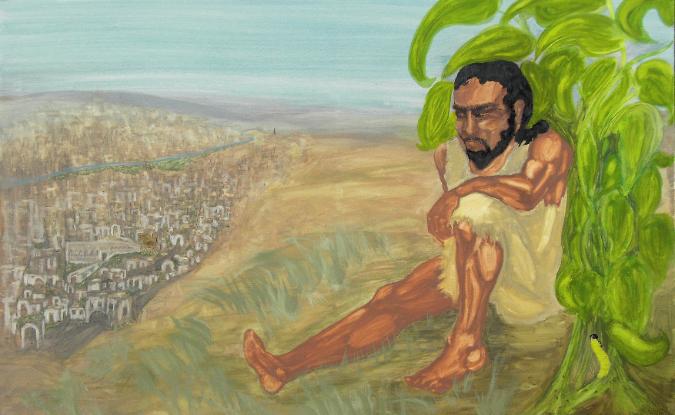
....
The opening words of the book, by their similarity to other prophetic books,
present Jonah as a prophet. His name confirms this for the attentive reader
familiar with the story of Israel as told in 1 Kings. Jonah is not merely a
prophet but a famous one.
- However, no sooner has Jonah the prophet been presented than his character becomes problematic.
- Prophets deliver God's messages (Am 3:3-8; 7:10-17)
even if they wish they cannot avoid doing so (Jer 20:9),
indeed even false prophets claim to proclaim a divine message (Ezek 13:2).
This dissonance instantly makes his character problematic. The
flashback of 1:5 suggests further dissonant
behaviour, "while" the crew are so frightened by the storm that they crying to
their "gods" and throwing the cargo overboard, Jonah is down in the hold, where
he has "lain down" and is "fast asleep"!
Jonah continues to act in contrary ways, when the lot has picked him out as
the cause of the problem, he proudly boasts of his religious and ethnic identity
(1:9). While the sailors ask God's pardon before throwing Jonah to the waves,
and continue with sacrifices after, Jonah safe in the belly of the fish shows no
sign of repentance! The great success of his brief sermon in Nineveh produces
either no reaction from Jonah, or displeasure and anger (4:1).
However, from this point on the character and his words begin to fit together
in a more coherent way. He tells us that God's decision to spare Nineveh,
following their repentance, is what he feared at the start, thus explaining the
motive of his flight towards Tarshish (4:2a). Adonai's tendency to pardon and
Jonah's - presumed - desire to see wicked Nineveh punished, explains his flight
and resignation.
God may stubbornly seek to convert and to pardon wicked Nineveh (1:2) but his
prophet is also stubborn. Following the divine repentance (3:10) and Adonai's
implied refusal to allow the unwilling prophet death (4:3-4), Jonah still waits
"to see what would become of the city" (4:5).
Jonah's stubbornness is reinforced when God asks him a second time if he is
"right" to be angry, for Jonah denies what God implies and proclaims himself
"angry enough to die" (4:9).
Thanks for enlightening. God bless you. I'm studying about Jonah, writing a novel about him and trying to improve it. I proposed a theory about how Jonah could survive in the stomach of the great fish in chapter II. Hope you will give a look at it.
ReplyDeletehttp://p.booklog.jp/book/72551/read
http://p.booklog.jp/book/72552/read
http://p.booklog.jp/book/100631/read
http://p.booklog.jp/book/100632/read